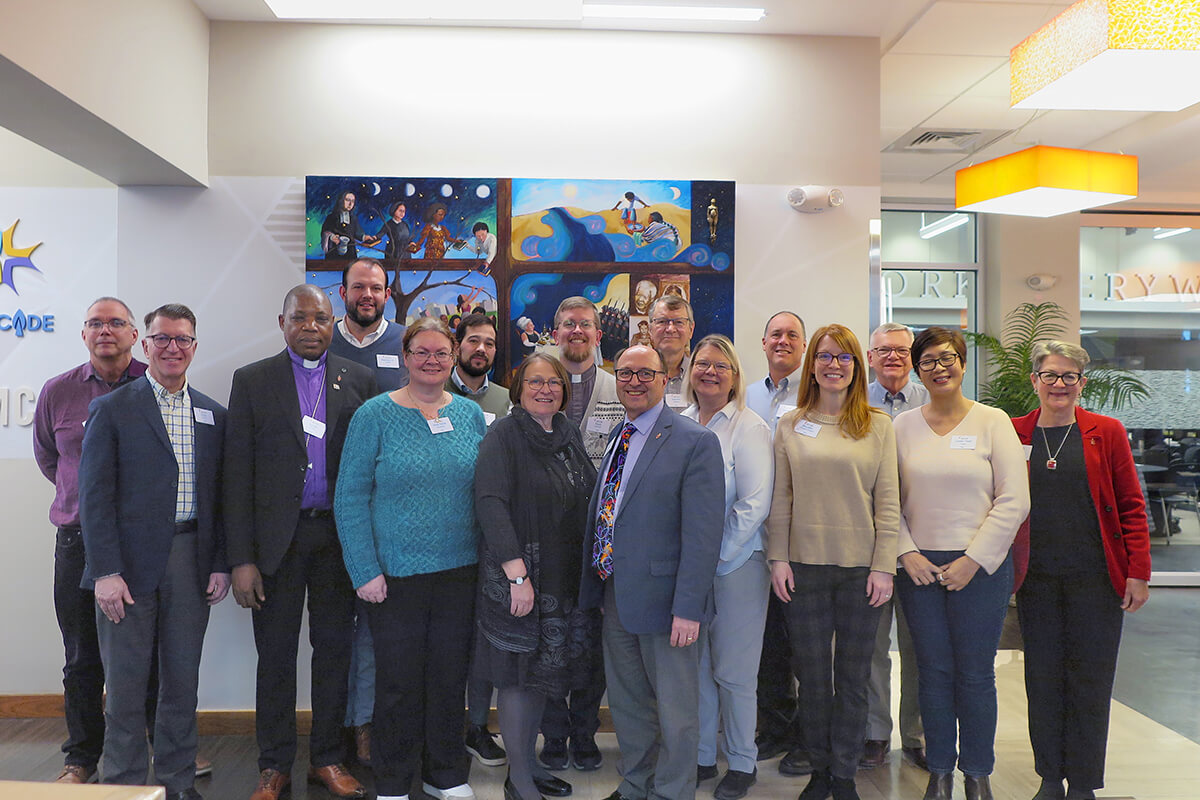A Comissão de Fé e Ordem da Igreja Metodista é um dos órgãos que ajuda a desenvolver o Livro Geral de Disciplina. A comissão é responsável por guiar a denominação em reflexão teológica informada e discernida.
A comissão, cujos membros incluem acadêmicos Metodistas Unidos e líderes ecumênicos de todo o mundo, tem tarefas adicionais atribuídas pela Conferência Geral do ano passado. O grupo se reuniu imediatamente antes da reunião da Comissão Permanente dos Assuntos das Conferências Centrais em Atlanta para fazer o seu trabalho.
“Estou encantado com a comissão que temos,” disse o bispo David A. Bard, o presidente da comissão. Ele também lidera as conferências de Michigan e Illinois Great Rivers.
“Nossa reunião foi muito boa. As pessoas são activas e engajadas. E há uma energia muito boa.”
A comissão tem quatro projectos principais para os próximos quatro anos, cada um com seu próprio grupo de trabalho.
- Rever a declaração teológica proposta “Enviados em Amor: Uma Compreensão Metodista Unida da Igreja,” o que articula porquê os Metodistas Unidos têm igreja em primeiro lugar.
- Rever a teologia sacramental Metodista Unida à luz do culto online que ganhou popularidade durante a pandemia da COVID.
- Elaborar uma declaração sobre a unidade Cristã e os relacionamentos intereclesiais.
- Examinar a teologia da regionalização.
Como parte do trabalho sobre teologia sacramental, a comissão planifica levar a cabo uma pesquisa para determinar como as igrejas com serviços online estão lidando com o sacramento da Sagrada Comunhão.
Assine a nossa nova newsletter eletrônica em espanhol e português UMCOMtigo
Você gosta do que está lendo e quer ver mais? Inscreva-se para receber nosso novo boletim eletrônico da UMCOMtigo, um resumo semanal em espanhol e português, com notícias, recursos e eventos importantes na vida da Igreja Metodista Unida
“Não que a prática necessariamente dite a reflexão teológica,” disse Bard. “Mas é bom saber o que está acontecendo lá fora.”
A comissão está particularmente ansiosa em concluir seu trabalho sobre “Enviados em Amor,” um projecto de mais de 16 anos. A Conferência Geral do ano passado pediu à comissão para revisar o documento Enviados em Amor para reflectir melhor a natureza mundial da igreja e tornar a escrita mais acessível a pessoas sem diplomas de seminário.
“Enviados em Amor’ é o nosso entendimento básico da igreja,” disse Bard. “Queremos que todas as outras peças sejam consistentes com isso, para que não tenhamos uma declaração sobre unidade que, de alguma forma, não se encaixe.”
Durante sua reunião recente, a comissão também enviou uma carta de apoio à Bispa Episcopal Mariann Edgar Budde, cujo sermão de 21 de Janeiro na Catedral Nacional de Washington atraiu atenção mundial.
O sermão provocou tanto criticas quanto elogios depois que ela pediu ao presidente Trump que demonstrasse misericórdia para com pessoas vulneráveis. “Você nos inspirou e nos encorajou,” escreveu a comissão. “Como comissão, achamos seu sermão profundamente enraizado na tradição profética de nossa fé Cristã compartilhada, ao mesmo tempo em que foi proferido com gentileza e respeito.”
O esforço para reimaginar a Disciplina avança
**Da Cruz é comunicador Metodista Unida em Angola Oeste com sede em Luanda.



